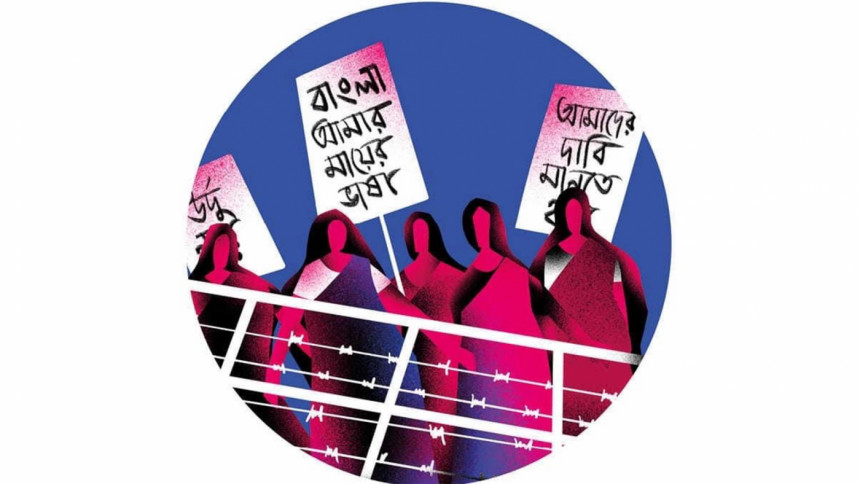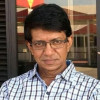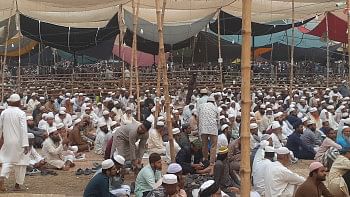Our Language Movement: Moments, Momentum, Milieu

Our Bhasha Andolan—the Language Movement—was undoubtedly a major event in our political history. In fact, it was the first major political movement in East Pakistan (present-day Bangladesh). Although 1952 is taken as the year of this movement, it neither began, nor did it end, in 1952 as such. Its history can be traced as far back as 1947 with the formation of the first Rashtra Bhasha Sangram Parishad (State Language Movement Council) in October that year. But Ekushey February—February 21, 1952—marks a watershed moment in our history, when thousands of students assembled in front of the old Arts Faculty building of Dhaka University, shouting slogans like "Rashtra Bhasha Bangla Chai" (We Demand Bangla as the State Language), and later disobeyed Section 144. The police eventually opened fire, killing five students and injuring many more. As a Bangla poem succinctly put it once, "Bangla was written in blood in 1952" (translation is author's own).
Indeed, the students themselves gave a conjunctural, but decisively fierce, voice to the Language Movement. But it quickly morphed into a people's movement, as Badruddin Umar's monumental, three-volume historical study of this movement rigorously reveals. Language itself turned out to be a massive site of class struggle. In fact, this movement would not have been possible without the extensive participation of peasants and workers. And the movement increasingly assumed a liberationist, emancipatory character, at least cutting the first turf for our national liberation movement of 1971—fundamentally a people's war against Pakistani neocolonialism—driven as it was by its three distinctly pronounced principles: equality, justice, and human dignity. But the very anticolonial ethos of our Language Movement was also evident right from the beginning, as the movement confronted and combatted what I wish to call linguistic colonialism.
But the era of linguistic colonialism is by no means over. Our middle-class, soggy, sentimental nationalism continues to celebrate the Ekushey on a yearly basis, while erasing, obscuring, and even occulting the sites of actual material contradictions and antagonisms that involve—among other things—the questions of class and gender, as well as the question of equality. This routine celebration also continues to evacuate the Ekushey of its radical content and emancipatory politics. Also, given the ways in which our mainstream, ruling-class political culture has evolved—a culture characterised by anti-people, anti-democratic, and even fascist elements today—the Dhaka-centric annual "celebration" of the Ekushey repeatedly reveals how it's reduced to a narrow "cultural" event, giving one the outrageously misleading impression that our Language Movement has nothing to do with the emancipatory aspirations and struggles of the oppressed in Bangladesh.
And the question remains: Along with economic justice or economic equality, where is linguistic justice or linguistic equality in our country today? There are violently unequal power relations between the privileged ones who know or use English, and the wretched of Bangladesh who speak or use Bangla (the ruling-class folks also use Bangla; but, no, I'm not speaking of them, and obviously they don't belong to the wretched in question). The language question in this instance continues to be the question of class, although the former also ranges beyond the latter. There are also unequal power relations between what is institutionally and otherwise legitimised as "standard Bangla," and non-standard Bangla/regional languages/dialects, etc. And, no less significantly, the languages of other nations, indigenous peoples, or ethnic minorities in Bangladesh decisively remain the most marginalised languages in the country. Of course, despite the narratives of so-called progress—the Caribbean poet Derek Walcott's line comes to mind, "Progress is history's dirty joke"—we haven't had any egalitarian language policy at the national level yet.
What all this means is that we have not yet been able to live up to the anticolonial spirit of our Language Movement. In fact, both our Language Movement and Liberation Movement have remained decisively and disastrously unfinished.
Finally, I'm not against learning English (or any foreign language), nor am I against what is called "technological progress." But then, I question those who continue to celebrate the English language in the name of globalisation, conveniently mystifying the stubborn facts that globalisation itself is a euphemism for the current stage of disaster capitalism and digital imperialism; that it is a "globaloney" (to use Eduardo Galeano's word) for many; that this very "globalisation" globalises unequal class relations, unequal race relations, unequal gender relations, and even unequal language relations themselves, as globalisation keeps unevenly connecting and interconnecting peoples, places, cultures, and languages across the world. And I think it is in this light that what has come to be known as the Fourth Industrial Revolution should be critically interrogated. But what we actually need is a new, even revolutionary politics that remains deeply committed to ensuring the integrity and equality of all mother tongues, among other things.
Dr Azfar Hussain is interim director of the graduate programme in social innovation, and associate professor of integrative, religious, and cultural studies at Grand Valley State University in Michigan, US. He is also the vice-president of the US-based Global Center for Advanced Studies (GCAS).


 For all latest news, follow The Daily Star's Google News channel.
For all latest news, follow The Daily Star's Google News channel. 



Comments